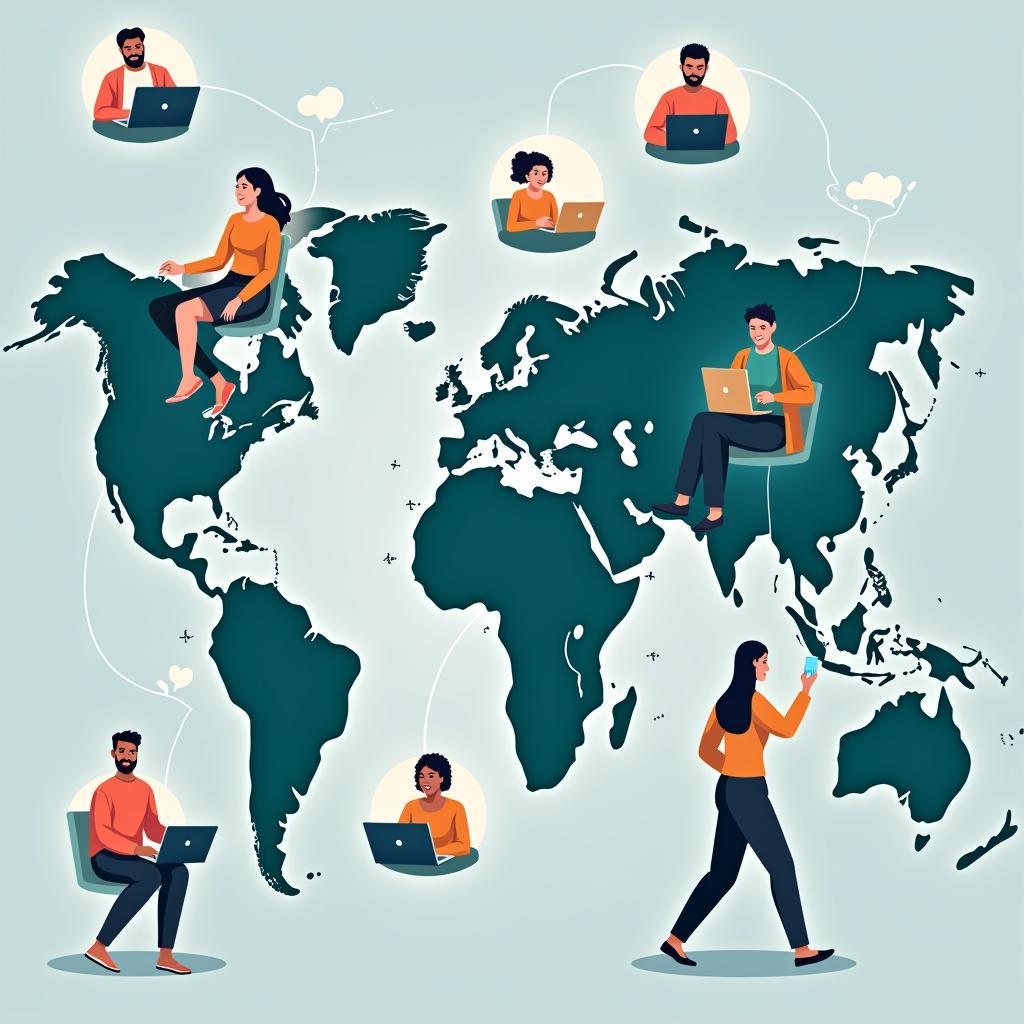The digital revolution is upon us, profoundly transforming the very fabric of our societies. “Digitalization And Society” isn’t just an abstract concept; it’s the daily reality of interconnected lives, blurring geographical boundaries and reshaping how we communicate, learn, work, and even experience peace.
The Digital Fabric of Modern Society
Today, technology weaves through every aspect of our lives. From the smartphones we hold to the social networks we engage with, digitalization has become as commonplace as the air we breathe. This interconnectedness has fostered a new era of globalization, bringing people and cultures closer than ever before.
This digital closeness presents a powerful opportunity to bridge cultural divides and nurture understanding. Imagine connecting with someone across the globe who shares your passion for peace, exchanging stories, and finding common ground despite the miles that separate you. This is the potential of digitalization for peace.
 People Connecting Through Technology
People Connecting Through Technology
The Digital Divide: A Challenge to Connection
However, this digital landscape isn’t without its challenges. The digital divide, the gap between those with access to technology and those without, threatens to exacerbate existing inequalities. This divide can hinder access to education, economic opportunities, and even vital information, further marginalizing vulnerable communities and stifling the potential for global peacebuilding.
Bridging this gap requires a collective effort. Governments, NGOs, and individuals must work together to ensure equitable access to technology and digital literacy. By empowering marginalized communities with digital tools and knowledge, we can unlock their potential to contribute to and benefit from a more peaceful and interconnected world.
Navigating the Digital Age: Fostering Peace Online
The internet, while a powerful tool for connection, can also be a breeding ground for misinformation, hate speech, and polarization. The anonymity afforded by the digital world can embolden negativity, making it crucial to cultivate a culture of online empathy and responsibility.
 Promoting Peace Through Digital Platforms
Promoting Peace Through Digital Platforms
So how can we, as individuals, harness the power of digitalization to champion peace?
- Be mindful of your digital footprint: Engage in respectful dialogue, challenge hate speech, and be responsible with the information you share.
- Amplify voices of peace: Share stories of hope, resilience, and compassion. Support organizations and individuals working tirelessly to build bridges of understanding.
- Use your platform for good: Advocate for digital literacy, equitable access to technology, and responsible online behavior.
A Digitally Connected Future: A Shared Vision for Peace
Digitalization has fundamentally reshaped our world, and its impact on society will only continue to grow. By recognizing both its potential and its pitfalls, we can navigate this digital age responsibly, using it as a tool to foster empathy, understanding, and ultimately, a more peaceful world.
The future of peace is inextricably linked to how we choose to shape the digital landscape. Let us use it wisely, ethically, and compassionately, building bridges of connection and understanding across the globe.
FAQs About Digitalization and Society
1. How does digitalization affect social movements?
Digital platforms have become powerful tools for organizing and mobilizing social movements, amplifying voices, and raising awareness about critical issues.
2. What are the ethical implications of artificial intelligence?
As AI becomes more integrated into our lives, it’s crucial to address ethical concerns surrounding bias, privacy, and job displacement.
3. How can we combat online hate speech effectively?
Combating online hate speech requires a multi-pronged approach, including education, legislation, and technological solutions.
4. What is the role of education in the digital age?
Education needs to adapt to the digital age, equipping individuals with critical thinking skills, digital literacy, and the ability to navigate the online world responsibly.
5. How can we ensure digital inclusion for marginalized communities?
Bridging the digital divide requires investing in infrastructure, providing affordable access, and promoting digital literacy programs for underserved populations.
For further insights on these topics and more, explore our related articles:
Let’s join hands in building a more inclusive, equitable, and peaceful digital future. Contact us at Phone Number: 02043854663, Email: [email protected], or visit us at Khu 34, Bắc Giang, 260000, Việt Nam. Our dedicated support team is available 24/7 to assist you.